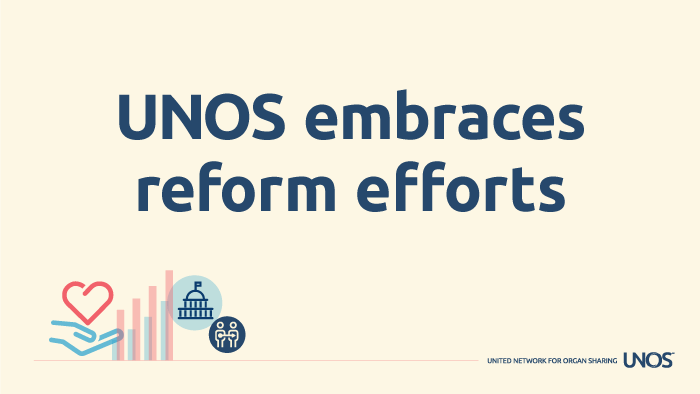UNOS Action Agenda and support of federal modernization initiatives pave the way for system improvements
Ahead of today’s U.S. Senate Committee on Finance hearing on the nation’s organ donation and transplant system, United Network for Organ Sharing (UNOS) reiterates its commitment to modernizing and reforming the nation’s organ donation and transplant system and working with Congress to achieve measurable results for patients. UNOS is the mission driven non-profit that serves as the Organ Procurement and Transplantation Network (OPTN) under contract with the Health Resources & Services Administration (HRSA).
“As long as there is a waitlist, it is our moral obligation to ensure we are promoting progress and increasing access to lifesaving transplants,” said UNOS CEO Maureen McBride, Ph.D. “Patients and families are counting on us to pursue improvements that increase transparency, strengthen accountability, and save more lives. We support calls for patient-focused improvements and want to be part of the solution.”
The UNOS Action Agenda
After being appointed interim CEO in October 2022, McBride immediately began to work on a series of proposed changes that were announced in January 2023 as the UNOS Action Agenda. The Action Agenda drives UNOS’ continued advocacy efforts and outlines critical reforms in eight different areas. These areas include patient empowerment, access, IT improvement, transportation, transparency, and governance. Many of these reforms have been endorsed by federal partners, members of Congress, and the wider organ donation and transplant community.
Numerous components of the UNOS Action Agenda align with HRSA’s Modernization Initiative announced in March 2023. “We are committed to working with HRSA, the U.S. Department of Health and Human Services, Congress and others who care about this system so deeply to assist in carrying out these reforms and to do our part to improve how we serve America’s organ donors, transplant patients and their families,” said McBride.
In support of a competitive bidding process, UNOS publicly announced in June that it does not oppose the Senate’s Securing the U.S. Organ Procurement and Transplantation Act, which would allow HRSA to increase competition for the management of the OPTN.
Advancing Equity in Transplant
UNOS’ Action Agenda includes calls to collect pre-waitlist data, an important change UNOS is advocating for with HRSA and Congress. Increases in transplant rates for patients of color are important and encouraging, but to eliminate inequities in access, more data is needed to understand and reduce inequities around which patients are added to the waiting list in the first place.
“Equity in access to transplant begins well before a patient is added to the waitlist,” McBride says. “To address equity holistically, we also need to understand the barriers patients with end-stage organ failure face when it comes to being referred for transplant.”
Maximizing The Gift Of Life
While some Action Agenda proposals require collaboration with HRSA and the federal government, UNOS has advanced efforts to the extent of its authority since McBride became CEO. This includes work to improve the efficiency of the organ donation and transplant system. “Each organ donation represents a precious opportunity to save a life, and it is a tragic loss when a donor’s generosity does not result in another life saved,” said McBride. “We have been working on robust solutions to maximize the potential of donated organs by developing tools to make it easier for transplant hospitals to say ‘yes’ to an organ and by getting these organs to their destination more safely and quickly.”
To address organ non-use – when an organ is recovered but not ultimately transplanted – UNOS and the OPTN have given transplant programs several tools to make it easier to say “yes” to an organ. At its June meeting, the OPTN Board of Directors approved the default use of offer filters for deceased donor kidney offers. These screening filters aim to speed up kidney acceptance rates and increase the number of transplants by sending time-sensitive organ offers automatically to programs most likely to accept organs with certain characteristics. Additionally, the OPTN recently launched a predictive analytics tool, and just concluded a national collaborative, aimed at improving organ acceptance rates at individual hospitals.
To reduce the risk of delay and loss of organs traveling by commercial air, UNOS and the donation and transplant community advocated for and are supporting provisions in the next Federal Aviation Administration (FAA) reauthorization that would enable the transportation of a donated organ in the passenger cabin instead of in the cargo hold of an airplane. Because of a post-9/11 change, organs are currently transported as cargo, which does not operate around the clock like the lifesaving organ donation system does. Provisions in both the House and Senate FAA reauthorization bills could possibly reverse that long-standing practice.
“As CEO of UNOS, I have sought a new level of collaboration and engagement with members of the nation’s organ donation and transplant community, our federal partners and elected officials,” said McBride. “UNOS is an organization that has not only embraced, but proposed, substantive reforms, and I look forward to working together to create a system that works better for every patient in need.”
About UNOS
United Network for Organ Sharing (UNOS) is the mission-driven non-profit serving as the nation’s transplant system under contract with the federal government. We lead the network of transplant hospitals, organ procurement organizations, and thousands of volunteers who are dedicated to honoring the gifts of life entrusted to us and to making lifesaving transplants possible for patients in need. Working together, we leverage data and advances in science and technology to continuously strengthen the system, increase the number of organs recovered and the number of transplants performed, and ensure patients across the nation have equitable access to transplant.

